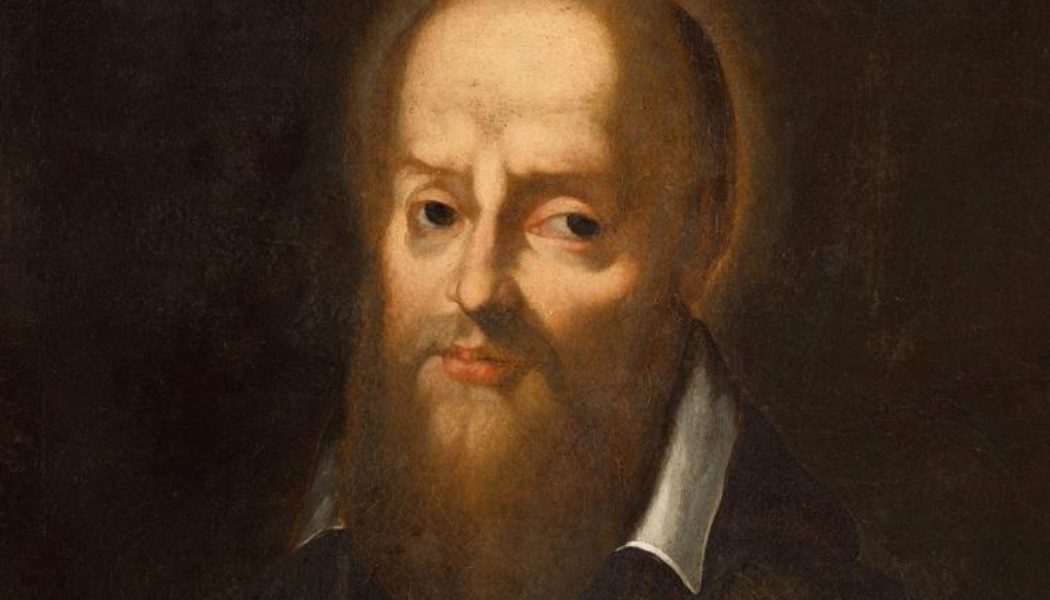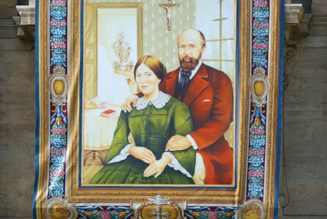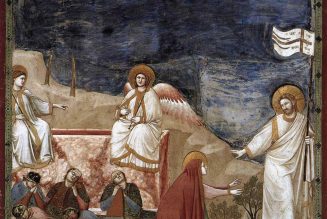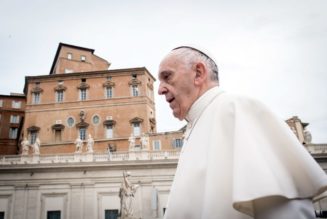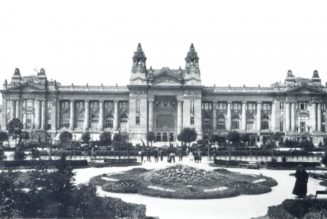
Exactly 400 years ago today, St. Francis de Sales ended his days in the same way he had lived most of them — having labored to his very last breath for the salvation of souls and the call for everyone to be saints.
The future doctor of the Church and long-time bishop of Geneva had been on the road to Lyons in his capacity as an adviser to Duke Charles Emmanuel I of Savoy and his family during the duke’s Christmas tour of the massive Duchy of Savoy, stretching across whole parts of southeastern France, western Italy and southwestern Switzerland.
Exhausted and increasingly ill from the travels and ceaseless toil, de Sales stopped at the convent of the Visitation Sisters at Lyons and there he saw for the last time his beloved spiritual friend, St. Jane de Chantal, whom he had served as spiritual director and with whom in 1610 had co-founded the Order of the Visitation. The sick bishop was forced to remain at the convent and took to a bed in the gardener’s hut.
Francis’ condition grew even more grave, but his last days were spent sitting upright, hearing confessions, and at the end of it he commended himself to Christ and reminded all who came to him that God is love. That declaration was one of the last things that he said, a recognition of God’s love in his life, and that he had done everything he could to proclaim that love to others.
On Dec. 28, 1622, he suffered a stroke and died. He was given a solemn funeral at Annecy — where he had lived and served as bishop as his actual diocesan seat, Geneva, was in the hands of the Protestants — on Jan. 24, 1623.
Whole volumes have been and should be dedicated to the extraordinary life and theological writings of this doctor of the Church. The episodes of his life, all documented and utterly true, still seem to defy reason and belief.
As a young man discerning the priesthood, he fell repeatedly from his horse despite being an expert rider. Each time he fell his sword and scabbard landed precisely in the shape of a cross. He took the incident for what it was, the affirmation of Christ’s call for him to be a priest.
During the contentious period of the Counter-Reformation, he re-evangelized the territory of the Chablais in the Duchy of Savoy (stretching today across parts of Switzerland and France), earning the enmity of the Protestants in Geneva who sent assassins to kill him. Instead, he won them to the Catholic faith.
And as he made his way across the snowy mountainous regions of Chablais, he found himself suddenly being pursued by a pack of wolves and escaped certain death only by lashing himself to the branches of a tree. He spent a freezing night and was rescued in the morning by a group of astonished farmers from nearby.
We can look as well at the work he did to preach to Protestants and to bring back fallen away Catholics who had embraced the Protestant cause — using the brilliant idea of printing apologetic works and sliding them under the doors of Protestant homes, apologetics and skillful communication that earned him the rightful title of Patron Saint of the Catholic Press.
These stories testify not merely to his zeal and his immense fortitude but also to his willingness to give utterly of himself to preach and proclaim the truths of the Church. They serve ultimately, however, only to give witness to Francis de Sales’ greatest hope for everyone: Holiness is obtainable in every person’s life. One of his most important sayings declared: “It is a mistake, a heresy, to want to exclude devoutness of life from among soldiers, from shops and offices, from royal courts, from the homes of the married.”
Every person is called to holiness. In this spirituality of Francis, epitomized above all by his great spiritual classics, the Introduction to the Devout Life (1609) and the lesser-known classic Treatise on the Love of God (1616), we see a recognition that everyone from kings and emperors all the way down to the humblest worker in the field is called to holiness. But it added something else, as well. And that is that holiness is not only for those who are in monasteries or convents or who are priests, nuns or bishops. Everyone, every layperson, is also called to holiness, and in that sense he anticipated by 300 years the Second Vatican Council with its stress on the role of the laity and its own proclamation of the “universal call to holiness.”
In similar fashion, Francis had a vision for apologetics that was likewise far ahead of his time. As a bishop, despite his aristocratic origins in the nobility of Savoy, he dressed very humbly, very simply. He also took as his own two important mottoes. The first was, “He who preaches with love, preaches effectively,” which cuts to the very heart of how he approached his listeners and those he was trying to evangelize. He also had as his episcopal motto in Latin, Non Excidet, meaning “he shall not fail.” The motto was not about himself. It pointed to God; if we trust in God who is love, He will not fail us. And that became one of the great burning mottos for the era.
He had already shown it at work in his first years after ordination to the priesthood in 1593 when he had been sent to Chablais to preach among the Calvinists. His mission and sermons lasted for four years and, in the face of great physical danger, hostility, doors slammed in his face and insults hurled at him from every direction, he was largely successful in converting most of the inhabitants.
Francis’ method of evangelization was clever, but it was also incredibly genuine. He recognized that the style of the times was to wage a war of rhetoric, a form of apologetics in which you tried to win arguments with those who held a different position from you. It could be effective, but it also posed challenges at times in attracting the uneducated.
Francis instead adopted a very different model. It is said that he began simply to preach one on one with the inhabitants of Chablais. What that meant to was that he had to reach out to them, to their hearts.
One of the things that characterized his preaching was that Francis could speak to anyone. He could be understood very clearly by kings and emperors, but also by humble washer women and by farmers. His preaching was clear, profound and utterly riveting. He was reasonable, unafraid to point out error, sin and heresy, but always touching the heart and the mind. He wove Scripture, doctrine, an understanding of the human person and imagery from everyday life into a style of preaching that proved irresistible to those who took the time to listen. And his stealth communications, calm and humble manner, and clever way of appealing to the heart brought many stubborn Calvinists to his preaching and then inevitably to the sacraments and to the Church.
After four years in the Chablais region, he could report without boasting of more than 70,000 conversions. It was said that the Reformers in Geneva raged in frustration when word reached them that there were almost no Protestants to be found in Chablais and that Francis had been responsible for all of it. He proved to the Calvinists his maxim, “Nothing is so strong as gentleness; nothing is so gentle as real strength.”
We are in an era in which culture is adamantly opposed to so much of everything that Francis believed, everything that we, as Christians believe. Yet 400 years removed from his death, his method tells us how to reach those who might have never encountered Christ or who might also be in their own minds, thinking themselves to be enemies of Christianity, enemies of the Church. Heart speaks to heart, Francis tells us. May our gentleness be our strength as we too try to speak to the hearts of today and to remind the world of one absolute truth: God is love. St. Francis de Sales, bishop and Doctor of the Church, pray for us.
Join Our Telegram Group : Salvation & Prosperity
